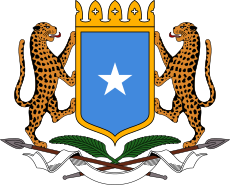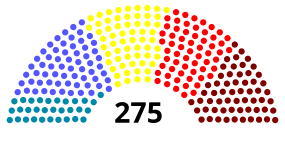House of the People (Somalia)
|
Federal Parliament of Somalia Baarlamaanka Federaalka Soomaaliya البرلمان الاتحادي في الصومال |
|
|---|---|
| 1st Federal Parliament | |
 |
|
| Type | |
| Type | |
| Houses | Upper house Lower house |
| History | |
| Founded | 20 August 2012 |
| Leadership | |
|
Speaker
|
Mohamed Osman Jawari
Since 28 August 2012 |
|
First Deputy Speaker
|
Jeylani Nur Ikar
Since 29 August 2012 |
|
Second Deputy Speaker
|
Mahad Abdalle Awad
Since 29 August 2012 |
| Structure | |
 |
|
| Elections | |
| TBD | |
|
Last election
|
20 August 2012 |
|
Next election
|
September–October 2016 (delayed) |
| Meeting place | |
| Mogadishu, Somalia | |
The Federal Parliament of Somalia (Somali: Golaha Shacabka Soomaaliya; often Baarlamaanka Federaalka Soomaaliya; Arabic: البرلمان الاتحادي في الصومال) is the national parliament of Somalia. Formed in August 2012, it is based in the capital Mogadishu and is bicameral, consisting of an Upper House and a Lower House (House of the People). The tenth Parliament of Somalia was inaugurated on 27 December 2016.
As part of the official "Roadmap for the End of Transition", a political process devised by former Prime Minister Abdiweli Mohamed Ali which provides clear benchmarks leading toward the establishment of permanent democratic institutions in Somalia by late August 2012, members of Somalia's then ruling Transitional Federal Government (TFG) and other administrative officials met in the northeastern town of Garowe in February 2012 to discuss post-transition arrangements. After extensive deliberations attended by regional actors and international observers, the conference ended in a signed agreement between TFG President Sharif Sheikh Ahmed, Prime Minister Ali, Speaker of Parliament Sharif Hassan Sheikh Aden, Puntland President Abdirahman Mohamed Farole, Galmudug President Mohamed Ahmed Alim and Ahlu Sunna Waljama'a representative Khalif Abdulkadir Noor stipulating that: a new 225 member bicameral parliament would be formed, consisting of an upper house seating 54 Senators as well as a lower house; 30% of the National Constituent Assembly (NCA) is earmarked for women; the President is to be appointed via a constitutional election; and the Prime Minister is selected by the president, who would then name a council of ministers.
...
Wikipedia
